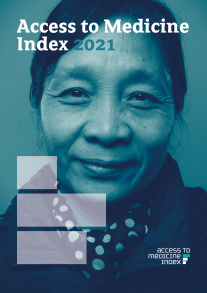2021 Access to Medicine Index
Date
26 January 2021
The 2021 Access to Medicine Index analyses the actions of 20 of the world's leading pharmaceutical companies to make medicines, vaccines and diagnostics more accessible. These 20 companies are assessed against 33 metrics spanning R&D, governance, pricing and supply across 106 low- and middle-income countries and for 82 diseases, conditions and pathogens.
These 82 diseases, conditions and pathogens have been identified as the most critical priorities regarding access to medicine, including HIV/AIDs, malaria and tuberculosis, and emerging infectious diseases such as those caused by coronaviruses and Zika, as well as non-communicable diseases such as diabetes, epilepsy and heart disease.
What's in the 2021 report?
GSK and Novartis compete for No.1. Pfizer is new in the top 5. The two leaders take a mature approach to managing access, and perform strongly in R&D for global health priorities.
Eight companies adopt processes to systematically address access to medicine for all new products.
Less than half of key products are covered by pharma companies’ access strategies in poorer countries.
R&D for COVID-19 has increased, yet other pandemic risks go unaddressed.
Detailed performance breakdown per company with insights into their sales, R&D and their products on the market
Detailed graphics identifying industry trends on various topics including R&D, access and the COVID-19 response
The strongest actions that pharmaceutical companies are currently taking to enhance access to medicine
Pharma companies inch forward
The results show progress in how companies are integrating access to medicine into governance structures, R&D processes, and monitoring efforts. Yet initiatives addressing access to specific products remain focused on a few products and countries.
“This Index was prepared during the worst public health crisis in a century – which has revealed the chronic inequalities of access to medicine like never before. Yet, after years of encouraging access planning, we are now seeing a strategic shift in this direction. This could radically change how fast access to new products is achieved – if company leadership is determined to ensure people living in low- and middle-income countries are not last in line,” says Jayasree K. Iyer, Executive Director of the Access to Medicine Foundation.
